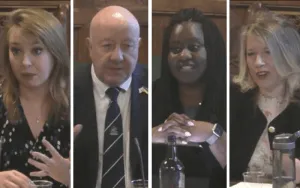The failure of the membership of the House of Lords to reflect the lived experience of disabled people is “infecting” the process of making policy, according to a disabled peer.
Lord [Kevin] Shinkwin, a Conservative peer, told fellow members of the Lords on Friday (pictured) that he believes that not one of the 54 peers appointed in the last two years had lived experience of disability.
He said his experience in the Lords over the last seven years suggested that there were just a dozen members with experience of non-age-related disability out of nearly 800 peers.
He said this was important “because it weakens our claim to be a House of expertise and experience when there are 14 million disabled people in the UK – unless, of course, one still believes that disabled people are simply a homogeneous group to and for whom stuff is done”.
He was speaking in support of a private members’ bill introduced by the academic and Tory peer Lord Norton, who has been convenor of the Campaign for an Effective Second Chamber for the last 20 years.
His House of Lords (peerage nominations) bill would, among other measures, ensure an appointments commission took diversity into account when considering future nominations.
Lord Shinkwin told Disability News Service (DNS) this week: “The deficit of lived experience informs and infects the policy-making process with predictable results: we never break out of the cycle of non-disabled politicians viewing disabled people as those to and for whom things are done.”
He was speaking following reports that Labour leader Keir Starmer would abolish the House of Lords if Labour wins power at the next general election.
Lord Shinkwin said: “Regardless of who wins the next election, we can’t afford to pretend that being so unrepresentative isn’t hurting and even endangering us.”
He said the Lords “urgently need to get our own house in order so that disabled peers feel supported and valued, if and when more are appointed.
“At the moment, this is not the case.”
In March, Lord Shinkwin told fellow peers of the lack of support he had received from the House of Lords following major surgery.
He told them: “I might as well have been dead.
“It reminded me that this wonderful institution remains a place whose rules and modus operandi were designed by and for rich, non-disabled men.
“I will say no more on the matter now, but it is clear to me that this needs to change if we are to become a stronger, more diverse, more representative House.
“If we do not want to be consigned to the past, we must stop living in the past.
“The appalling way we treat members whose disability enforces temporary absence from your Lordships’ House is indefensible and cannot continue.”
Although he provided no further details of how he had been treated, he told DNS this week that, until the Lords gets its “house in order” when it comes to procedures and ways of working, “any disabled person who’s appointed will face the same problems I experienced”.
He added: “It’s awful that this discrimination is being perpetrated as a matter of course by part of the national law-making body, which should be a beacon of best practice.”
Baroness Falkner, the crossbench peer and chair of the Equality and Human Rights Commission, also offered support to Lord Norton’s bill.
She told fellow peers last week that it was important to have diversity in the Lords so its membership could “demonstrate to our diverse population that there are some members of their kind, of their lived experience, who form part of the legislature and are aware of the problems of their tangible day-to-day lives”.
Baroness Neville-Rolfe, a Cabinet Office minister, made it clear that the government did not support the bill.
She said it would hand more power to “an unelected and ultimately unaccountable body to restrict the ability of the prime minister to make recommendations to the sovereign, and indeed allowing it to come up with its own additional criteria for appointing new peers”.
The bill passed its second reading and will now be debated further at its committee stage.
A note from the editor:
Please consider making a voluntary financial contribution to support the work of DNS and allow it to continue producing independent, carefully-researched news stories that focus on the lives and rights of disabled people and their user-led organisations.
Please do not contribute if you cannot afford to do so, and please note that DNS is not a charity. It is run and owned by disabled journalist John Pring and has been from its launch in April 2009.
Thank you for anything you can do to support the work of DNS…

 Disabled peers speak of ‘daily fight’ against access barriers in House of Lords
Disabled peers speak of ‘daily fight’ against access barriers in House of Lords Lords is ‘aeons ahead’ of Commons on access, disabled MP tells colleagues
Lords is ‘aeons ahead’ of Commons on access, disabled MP tells colleagues Assisted suicide bill will have ‘serious and profound’ negative impact on disabled people, MPs are told
Assisted suicide bill will have ‘serious and profound’ negative impact on disabled people, MPs are told